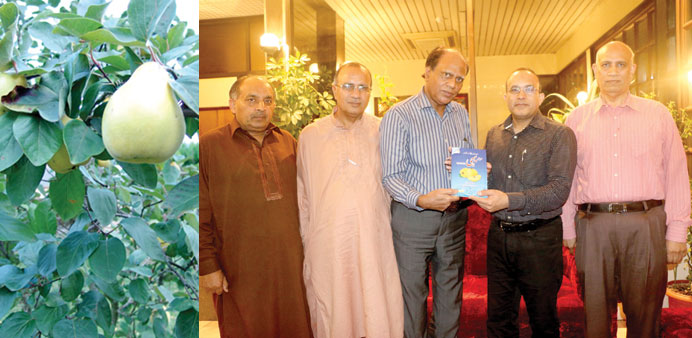FRUITFUL READING: Muhammad Nazar Yousuf (3rd from left) presenting his book to Abrar Hussain, President of PAS, in Doha recently. Photo by Umer Nangiana
Quince, the Medicine of Heart, by Muhammad
Nazar Yousaf, was recently launched in Doha
from the platform of Pakistan Art Society (PAS)
By Umer Nangiana
Containing secrets of treating heart ailments with a fruit in the light of medical knowledge given by Prophet Muhammad (PBUH), Muhammad Nazar Yousaf, a Research Assistant at Dr Nazir Hussain Research Centre (DNHRC), Pakistan has compiled a research-based book that highlights the immense health benefits of Bahi or quince.
Quince, the Medicine of Heart, was recently launched here from the platform of Pakistan Art Society (PAS) Doha. Yousaf, a retired Saudi Airlines employee and a researcher and writer, himself was here to present the book to PAS President Abrar Hussain and others.
From the origin of this less-known fruit, to its uses in medicine over centuries and its potential to treat different heart diseases, the book contains research-backed knowledge on how the fruit should be used with real life examples and references to cases where it worked for heart patients.
It is a research-based exploratory work that talks about the health benefits of this fruit called Bahi in Urdu based on Tibb-e-Nabvi, the medical knowledge given by Prophet Muhammad (PBUH). Yousuf has provided with all the sources of his research in the book.
“During the course of my research, I studied all the related and reliable sources of Hadith (Sayings of Prophet Muhammad PBUH) about the fruit. I wanted to know how this fruit got featured in Tibb-e-Nabvi,” Yousuf told Community in a chat after the launch of the book recently.
“I discovered that it was Hadrat Jabir, one of the Prophet’s companions, who had brought this fruit to him from Taif (Saudi Arabia). Prophet Muhammad (PBUH) had told Hadrat, while giving him the fruit, to eat it because it prevents many heart-related diseases and is very beneficial in treating them,” revealed the researcher and writer from Pakistan.
There are many procedures for eating it. A heart patient is recommended half a quince in the morning and half in the night. It can be prepared with many recipes included in the book. It can also be used in desserts, and in Turkey, they cook it with meat in the form of a curry. A full ripe fruit gets sweeter and then it can be eaten.
This fruit originally was discovered in Cydonia, Greece 4,000 years ago. And then its cultivation began and it reached Mesopotamia before spreading in this region. Yousuf said now many countries like Iran and Turkey claim that it originated from their lands. He has discussed the entire debate in the book.
“I have interviewed many heart patients during the course of my research, mentioned in my book. Even a university in UK has approved and declared that the contents of this fruit are very good for cardio-vascular system,” added Yousuf.
He has been into writing since childhood. Even in Saudi Arabia where he was working for Saudi Airlines, he used to write essays in the Urdu edition of Arab News. “I would say I had this knack for writing, though I used to write fiction most of the times early on, especially when I was back in Pakistan,” Yousuf told us.
The work on this book started after he met Dr Nazir Hussain, who hosts a show on Health TV with the title of Tibb-e-Nabvi in Pakistan. He asked Yousuf to do something substantive for the public good. He told him about quince.
“Then I did my research on this less-known fruit and I found it selling in one of the markets in Karachi. But, they were selling it for 1000 Pakistani rupees a kilo which was too costly. Together with Dr Nazir, we decided to bring this price down to Rs200 by creating awareness about its health benefits,” said Yousuf.
Then he invited Yousuf to his programme on TV and they talked about its health benefits in the light of his research. Quince resembles apple or apricot and is very hard. In America they also call it woody apple. In Pakistan, it is cultivated on a large scale in Swat area, however, the best of it comes from Balochistan province, said Yousuf.
“We have been continuously trying to promote this fruit and I think because of our efforts its price has come down considerably in Pakistan now. We have done programmes on it for almost a year. The reason for the hike in its price was the lack of awareness about this fruit and its benefits among people,” said the writer.
He said he has received positive feedback from people on the book which is available throughout Pakistan and now in Qatar as well. It is also available online. People have been writing to Yousuf through e-mails and on his Facebook page about their experiences with the fruit and how they have benefited from it and he said it has been well-received in Pakistan where they had to go in for a second edition.

